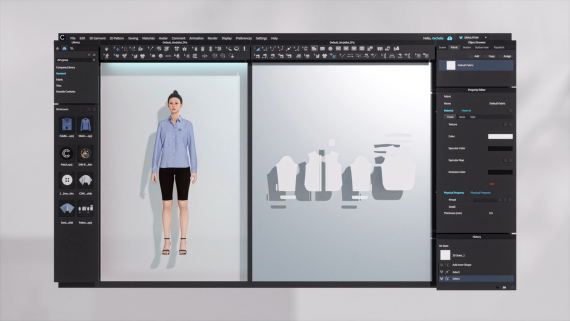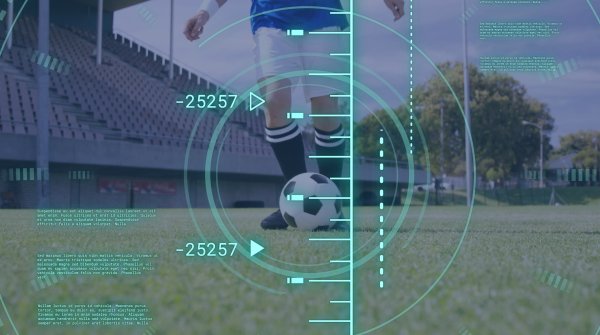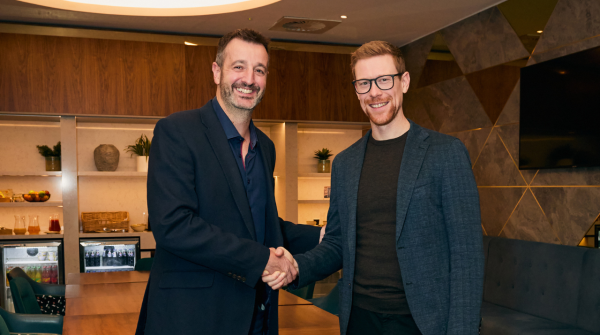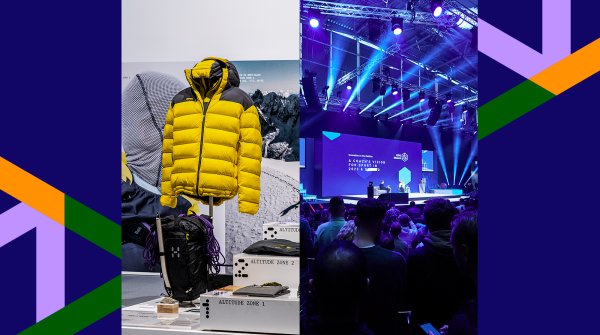- More creativity: Artificial intelligence challenges players
- VR goggles from IMPROVR: training at the next level
- CLO designs virtual clothes - from the idea to the styling
- Special Locally technology combines online and offline shopping
- Contact with retailers: Joor supports brands worldwide
- The quickest way to a private gym with Samsung SmartThings
- LBMA and ISPO Munich 2024: technology trends for modern retail
- Artificial intelligence and virtual reality push the sports industry
- ISPO Munich 2024: Strong partner for decision-makers
Artificial intelligence is boosting creativity in team sports - predicts Prof. Dr. Daniel Memmert, Managing Director and Professor at the Institute for Training Science and Sports Informatics at the German Sport University Cologne. According to him, the development and use of data-based analysis and artificial intelligence in professional sport, particularly in soccer, is progressing in leaps and bounds. In recent years, new types of data and metrics have been developed, for example to analyze pressing behavior and space control. Data is collected in real time and can be analyzed using software tools. "First and second division clubs are already using these technologies, supported by software from major companies worldwide," says Prof. Memmert. But AI-supported analysis will also soon become more accessible for amateur sport. He is optimistic that "these technologies, similar to smartphone cameras today, will soon be widely used and will also be available to lower-class clubs".
In addition to the ever-improving AI-based analysis and the associated increase in sporting performance, the sports computer scientist sees (match) creativity as a future success factor. "As more and more tactical and strategic details become predictable, the ability to play creatively on the pitch will make the decisive difference - an area that is currently still not given much consideration in training methods."

"We are convinced that this type of virtual training will become indispensable. We even go so far as to say that any athlete who doesn't use this training will be at a competitive disadvantage," is how Alexander Will, CEO and founder of IMPROVR GmbH, describes the future. The German start-up's VR glasses optimize athletes' performance skills with MR-based games that can be played anywhere and at any time. "With this unique virtual brain-based performance training, IMPROVR goes into areas that cannot be covered by conventional training methods. The hidden potential that lies there is used specifically for the athlete in order to achieve the best possible performance from each athlete." The company has focused on professional sport right from the start. In consultation with sports scientist and neuroathletics trainer Lars Lienhard, the highest quality Brain-Based Performance (BBP) products have been developed. "Within professional sports, we then focused primarily on tennis and soccer. In some cases, however, we have also supported top athletes from other sports in order to gather and derive experience here too. One example is skeleton athlete Janine Flock, who had to return to rehab as quickly as possible following an operation on her intervertebral disc," says Will.
"By using 3D technology such as CLO, we have a communication tool that supports us throughout the entire product development process. Product managers, designers, developers, pattern makers and suppliers can work together in a more effective, detailed, concrete and targeted way," states the Swiss sporting goods manufacturer Scott Sports. CLO Virtual Fashion is the company behind CLO, a leading 3D fashion design software used by designers, small businesses and fashion industry giants for a seamless digital workflow. With more than two decades of research and development in accurate garment simulation, CLO Virtual Fashion is dedicated to helping users through every step of garment development, from concept to design, from manufacturing to marketing, and from fitting to styling. In addition to 3D design software, CLO Virtual Fashion's products include CLO-SET (a digital asset management and collaboration platform) and CONNECT (a digital fashion hub and marketplace) as well as solutions for end consumers, such as virtual eCommerce try-ons.
Etane Ebako from Intersport describes the benefits of the software as follows: "Working with 3D assets has made it very easy for our designers and PLM staff to communicate ideas visually with buyers who are not as creatively inclined, which has helped us make faster decisions on projects." The advanced 3D fabric simulations connect every part of the garment manufacturing process. "We are building a world where real and virtual garments are seamlessly connected through our software, platforms and networked solutions," says Andrea Gualtieri Turri, Business Development Manager. Many well-known sportswear brands such as Adidas, Intersport, JD Sports, Decathlon, New Balance and Peak Performance are already using this technology.

Locally's main target group includes brands and retailers that combine online and offline shopping experiences. According to Mike Massey, CEO and founder of Locally, European brands such as Assos, Arc'teryx, Lowa Boots, Thule and Salomon are best practice examples of using its technology "to improve the buyer's journey from first contact to in-store purchase". Through real-time inventory, these brands would enable their customers to find products in nearby stores, providing a seamless shopping experience that supports local retail and builds brand loyalty.
Arc'teryx, known for high-performance outdoor clothing, for example, uses Locally to appeal to both urban customers and those planning outdoor trips. "The outdoor brand combines its online brand experience with Locally's in-store availability features to enable a seamless transition from digital browsing to in-store purchase, increasing both the brand's reach and convenience for the customer," says Massey.
Lowa Boots, on the other hand, uses technology to guide customers to retailers that carry specific models. "This is particularly valuable for hikers who need reliable footwear without having to wait for online shipping," says the Locally CEO. And: "By showcasing its inventory at retailers in or near popular hiking regions, Lowa can ensure that its products are available where customers need them most, making it easier for outdoor enthusiasts to access the footwear that's right for their area."

Joor is the world's leading wholesale management ecosystem, processing nearly $20 billion worth of transactions annually. "We help more than 14,000 brands and over 650,000 fashion buyers in 150 countries connect through our platform. Notable sports-oriented brands currently using Joor include Colmar, Descente, Ecoalf, Fabletics, Pyrenex and Umbro, as well as many others," says Amanda McCormick Bacal, SVP of Marketing. The B2B wholesale platform enables brands to showcase their latest collections and build relationships with the world's leading retailers anytime, anywhere. "Thanks to our excellent customer support and reporting tools, brands can drive shopper visits and interactions by customizing virtual storefronts with branded and curated content. Our platform makes it easy to manage product catalogs, create linesheets in seconds and share them with shoppers. We also offer bulk editing tools to add, edit and market styles."
According to McCormick Bacal, Joor understands the growing importance of premium sportswear: That's why the US-based company is launching "Sporting Style: JOOR x ISPO", a series of two digital trade show events on the JOOR Passport platform, hosted in partnership with ISPO Munich 2024. These events include one presentation curated for brands and one curated for retailers to foster new industry connections. They also offer a global opportunity to connect digitally with premium retailers.
And all ISPO Munich 2024 exhibitors who activate their Joor membership now will receive four months of free access - four weeks before and three months after: "This will increase visibility far beyond the duration of the physical trade show," says Sterchele.
Suitable lighting scenarios or individual temperature control in the private gym at home - nothing could be easier. Visitors to ISPO Munich 2024 can experience in the Mobile Smart Home how they can use their own four walls in even more diverse ways with Samsung SmartThings. "The unique thing about Samsung SmartThings is its openness. The compatibility of thousands of products from different manufacturers and the simultaneous protection of data by Samsung Knox Matrix can open up unimagined possibilities," says Dr. Thorsten Böker, Director Business Development at Samsung Electronics Germany.
"We are showing some of these in Munich: For example, as a private gym using a matching setup of our tablets and smart TVs, combined with an indoor training bike from TBD. Enhanced with features such as suitable lighting scenarios or individual temperature control, the training can begin. Our wearables are also included: the Galaxy Watch Ultra, the Galaxy Ring and our smartphones offer many exciting opportunities to support a healthy lifestyle - naturally also linked via SmartThings", says Dr. Böker.
No longer a dream of the future: the Samsung Food app on the smartphone suggests suitable recipes for the selected training goal based on the data collected by the Galaxy Ring or Galaxy Watch Ultra and the contents of the smart fridge. "In addition to comprehensive control of the smart home, SmartThings can also be used to provide personalized lifestyle support - based on a common platform."
The Location Based Marketing Association (The LBMA) is an international association that unites technology companies that develop innovative solutions for stationary and online retail. "Our main target group comprises companies and organizations that specialize in location-based technologies and marketing solutions. This includes technology service providers, marketing experts as well as retailers and brands that want to offer and promote innovative, location-based interactions and seamless networking with the digital world. As an association, we present our members' solutions to the market in a targeted manner and disseminate them via various formats," explains Angelique Szameitat, Chief Operating Officer. "Through LBMA Services - a business unit of the association - we offer a wide range of marketing and communication opportunities." The manager cites a few examples of how a wide variety of technologies are boosting the retail sector - all of the LBMA members mentioned will also be on site at ISPO Munich 2024.
- Ariadne Maps uses its intelligent analytics solutions to analyse customer behaviour and dwell time in Segmüller furniture stores, thereby optimizing the conversion rate and the shopping experience.
- With the help of Remira, Pier14 relies on an omnichannel digital signage solution that offers personalized product recommendations via interactive touchscreens with RFID recognition. The real-time linking of stock, prices and content supports targeted advice and encourages impulsive purchases.
- Passcreator by Fobi simplifies administration and communication in clubs with digital membership cards for Apple Wallet and Google Wallet. Clubs can easily inform their members via push notification and efficiently organize admission control.
“Innovative solutions from our member svarmony illustrate just how much XR can enrich the customer experience,” says manager Szameitat. As a leading provider in the field of extended reality (XR), svarmony offers specialized and scalable solutions for retailers, including
- aryve, an AR-based navigation system that guides customers intuitively through stores and simplifies orientation in large sales areas.
- Product visualizers for detailed, individual product presentations that give customers a realistic idea of the products.
- An avatar application that acts as a charming virtual advisor to explain products and create an emotional experience.
These technologies would enable retailers to present both products and the brand in an interactive and in-depth way. According to them, the solutions increase customer satisfaction and promote brand loyalty through unforgettable experiences.
Although interest in 3D design is growing in the fashion industry, there are still many parts of the industry that have not yet embraced digital technology, emphasizes Business Development Manager Turri. "Our goal is to help designers, sellers and consumers design and consume garments more efficiently and sustainably, and to one day be the beginning and end of every garment in the world."
IMPROVR CEO Will sees a similar development for virtual training: "Our years of experience in professional sport have also shown us that there are a variety of brain-based performance exercises that are also indispensable for ambitious amateur athletes. With the realization that even amateur athletes only have the opportunity to achieve 100 percent of their performance."
The LBMA shares this view in relation to retail: "We believe that AI, XR, AR and VR technologies will revolutionize retail. These technologies create a seamless connection between online and offline experiences and make it possible to make the shopping experience more individual and interactive. Stationary retailers can use immersive external realities with mobile devices or wearables to bring XR experiences and AI products to life in a completely new way, thereby significantly enhancing the shopping experience," says Angelique Szameitat.
Mike Massey from Locally adds: "Together, VR and AI will enhance physical shopping rather than replace it. These technologies create a hybrid shopping environment where customers can enjoy the best of both worlds - online convenience paired with the tangible, immersive benefits of in-store experiences. VR and AI make shopping more engaging, convenient and tailored to individual preferences, encouraging customers to interact with brands in both the physical and digital space." Rather than displacing physical stores, they will ensure that in-store shopping "remains relevant, vibrant and essential", according to the Locally CEO.
And for Samsung, it is clear: "We believe that VR and AI can help make spaces and opportunities for sport and fitness more flexible. Virtual environments in particular can enable a wide range of training options within your own four walls - very diverse, adapted to your personal fitness level and independent of the weather."
In the "Digitize & Retail Hub" for innovative technologies, ISPO Munich 2024 will not only present companies such as IMPROVR, CLO, Locally, Samsung and many, many more, as well as some members of the international Location Based Marketing Association (LBMA), but there will also be a stage with an extensive program. Various keynote speakers will share their experiences and inspiring ideas. They will also talk about the possibilities of integrating AI and VR. As part of the Future Lab, the "Digitize & Retail Hub" is an area specially set up for providers of digital solutions to offer a meeting place for decision-makers from retail, brands and manufacturers. The advantage for visitors to ISPO Munich 2024 is obvious: they will find the right technological solutions for every step in one place - whether development, production or distribution.
 SportsTechUnlocking the Future of Sports with AI
SportsTechUnlocking the Future of Sports with AI
- ISPO awards
- Mountain sports
- Bike
- Design
- Retail
- Fitness
- Health
- ISPO Job Market
- ISPO Munich
- ISPO Shanghai
- Running
- Brands
- Sustainability
- Olympia
- OutDoor
- Promotion
- Sports Business
- ISPO Textrends
- Triathlon
- Water sports
- Winter sports
- eSports
- SportsTech
- OutDoor by ISPO
- Heroes
- Transformation
- Sport Fashion
- Urban Culture
- Challenges of a CEO
- Trade fairs
- Sports
- Find the Balance
- Product reviews
- Newsletter Exclusive Area
- Magazine





